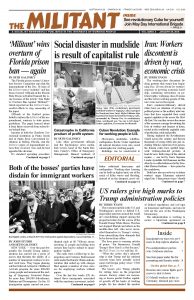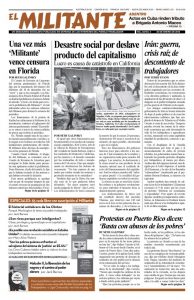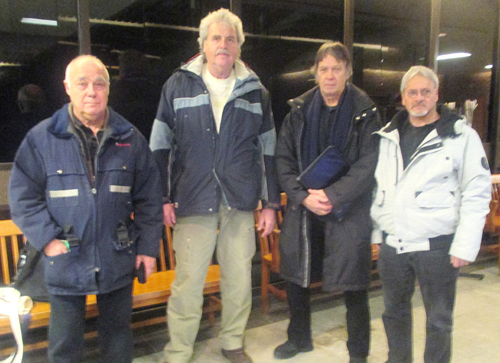MONTREAL — After six full days, jury deliberations continue in the Canadian government’s frame-up trial of locomotive engineer Tom Harding and train traffic controller Richard Labrie, both members of United Steelworkers Local 1976. Along with Montreal, Maine and Atlantic Railway low-level former official Jean Demaitre, the unionists are charged with criminal negligence causing death in the July 2013 Lac-Mégantic, Quebec, oil train derailment, explosion and fire that killed 47 people.
Above, activists with the Citizens and Groups Coalition for Rail Safety in Lac-Mégantic attend closing sessions of trial. From left, Gilles Fluet, Gilbert Carette, Robert Bellefleur and Richard Poirier.
The only time the 12 jurors have come out was to ask the judge for clarification of the meaning of “reasonable doubt.”
Since the trial began Oct. 2 in Sherbrooke, it has been clear that Harding is the main target of the rail bosses and the government. Thomas Walsh, one of Harding’s two attorneys, told the Sherbrooke daily La Tribune Jan. 11 that the trial should never have taken place. “The goal was never to understand the accident,” he said, “but to blame someone.”
In his final arguments, lawyer Charles Shearson, also representing Harding, told the jury that Harding was being framed up. “As the driver of the train,” Shearson said, “he was an easy target to shift responsibility to.”
Shearson described how Harding, a safety-conscious rail worker with decades of experience was, like the people of Lac-Mégantic, a victim of company policies that placed profits before safety. And he explained how officials of Ottawa’s Transport Canada agency were complicit with the company bosses.
A number of people from Lac-Mégantic attended Shearson’s presentation in solidarity with Harding. They believe the rail bosses and government officials should be in the dock, not rail workers.
If convicted, the three defendants could face life in prison. If the jury cannot come to a unanimous decision on the criminal negligence charges against Harding, it has the option of convicting him of lesser charges of “dangerous operation of railway equipment” or “dangerous operation of railway equipment causing death,” with maximum penalties of five and 14 years respectively.


